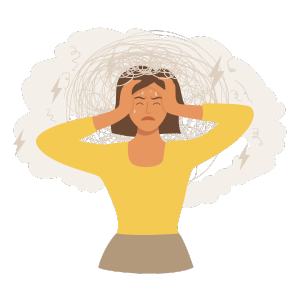Anxiety, including Understanding Anxiety, is a prevalent and often misunderstood mental health condition that affects millions of people worldwide. It is more than just feeling stressed or nervous; it’s a complex emotional state that can significantly impact a person’s daily life.
Anxiety is a natural response to stress or danger. It’s a feeling of unease, fear, or apprehension about something with an uncertain outcome. In many cases, anxiety can be helpful, as it can motivate us to prepare for challenges or stay alert in potentially risky situations. However, when anxiety becomes chronic, overwhelming, and disruptive to daily life, it is classified as a mental health disorder.
What are the different types of Anxiety Disorders?
There are several types of anxiety disorders, each with its unique features:

- Generalized Anxiety Disorder (GAD): GAD involves excessive worry and fear about everyday situations and often leads to physical symptoms such as restlessness, muscle tension, and sleep disturbances.
- Social Anxiety Disorder: People with social anxiety disorder experience intense fear and avoidance of social situations due to a fear of judgment or embarrassment.
- Panic Disorder: Panic disorder is characterized by recurrent and unexpected panic attacks, which are sudden surges of intense fear or discomfort accompanied by physical symptoms like rapid heart rate and shortness of breath.
- Obsessive-Compulsive Disorder (OCD): OCD involves the presence of intrusive, unwanted thoughts (obsessions) and repetitive behaviors (compulsions) performed to alleviate anxiety.
- Post-Traumatic Stress Disorder (PTSD): PTSD occurs in individuals who have experienced or witnessed a traumatic event and continue to suffer from intrusive thoughts, nightmares, and heightened arousal long after the event.
What causes Anxiety Disorders?
- Genetics: There is evidence to suggest that genetics plays a role in the development of anxiety disorders. If you have a family history of anxiety or other mental health conditions, you may be at a higher risk.
- Brain Chemistry: Imbalances in neurotransmitters, such as serotonin and dopamine, can contribute to anxiety. These chemicals play a crucial role in regulating mood and emotions.
- Trauma and Stress: Traumatic life events, such as accidents, abuse, or loss of a loved one, can trigger anxiety disorders. Chronic stress, whether related to work, relationships, or financial concerns, can also lead to anxiety.
- Personality Factors: Some individuals are naturally more predisposed to anxiety due to their personality traits. Perfectionism, excessive worrying, or a tendency to be highly sensitive can contribute to anxiety disorders.
What are the common symptoms of Anxiety?
The symptoms of anxiety can vary from person to person, but some common ones include:
- Excessive Worrying: Chronic and uncontrollable worrying about everyday matters or potential future events.
- Physical Symptoms: Anxiety can manifest physically, leading to symptoms like increased heart rate, sweating, trembling, muscle tension, and restlessness.
- Irritability: Feelings of irritability, frustration, or anger can be common in people with anxiety disorders.
- Sleep Disturbances: Anxiety can disrupt sleep patterns, leading to difficulties falling asleep or staying asleep.
- Cognitive Symptoms: Racing thoughts, difficulty concentrating, and a sense of impending doom or danger are often experienced by those with anxiety.
- Avoidance Behavior: People with anxiety may avoid situations, places, or activities that trigger their anxiety, which can limit their daily functioning and quality of life.
How can I cope with Anxiety?
- Professional Help: If you suspect you have an anxiety disorder, it’s essential to seek professional help. Therapies, such as cognitive-behavioral therapy (CBT) and cognitive hypnotic psychotherapy (CHCP) or medication prescribed by a psychiatrist, can be highly effective in managing anxiety.
- Mindfulness and Relaxation Techniques: Practicing mindfulness, deep breathing, progressive muscle relaxation, or meditation can help reduce anxiety symptoms and promote relaxation.
- Physical Activity: Regular exercise has been shown to reduce anxiety and stress by releasing endorphins, the body’s natural mood lifters.
- Balanced Diet: Eating a well-balanced diet can positively impact your mood and energy levels. Limiting caffeine and sugar intake can also help manage anxiety.
- Sleep Hygiene: Establishing a regular sleep routine and creating a comfortable sleep environment can improve sleep quality, reducing anxiety-related sleep disturbances.
- Social Support: Connecting with friends and family can provide emotional support and alleviate feelings of isolation that often accompany anxiety.
Understanding Anxiety
Anxiety is a common and treatable mental health condition that can affect anyone. Understanding its causes, recognizing its symptoms, and adopting effective coping strategies are crucial steps toward managing and ultimately overcoming anxiety. Seeking professional help is essential for those struggling with severe or chronic anxiety, as trained therapists and medical professionals can provide tailored guidance and treatment options. With the right support and strategies, individuals can lead fulfilling lives despite the challenges posed by anxiety.